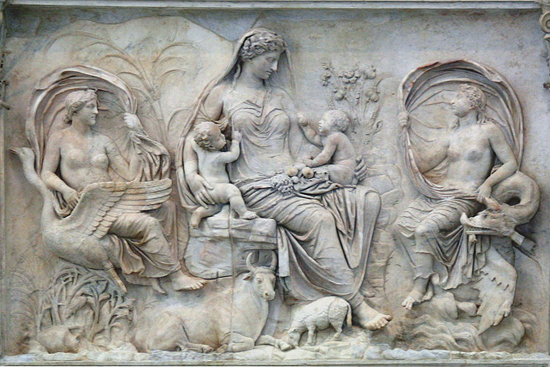A history class studies ancient life for average Romans
CAS class bypasses emperors to study life for average people

Topics in James Uden’s class include the religion of Romans, whose Earth goddess is depicted in this ancient relief. Photo by Chris Nas
Class by class, lecture by lecture, question asked by question answered, an education is built. This is one of a series of visits to one class, on one day, in search of those building blocks at BU.
Friends, Romans, countrymen, lend me your ears, er, eyes: we come to ignore Caesar, not to study him.
Sure, you can learn about important Roman leaders at BU, but in James Uden’s class The World of Rome, the academic lens is on the Every Roman. Uden’s students ponder what it felt like, day to day, for average ancients: what they ate, how they kicked back, what they worshipped. Oh, and the gynecological advice dispensed to new moms.
That last topic both drew chuckles and caused some discomfort among the 80 students in a recent class, as Uden, a College of Arts & Sciences assistant professor of classical studies, presents advice from a circa second century A.D. manual. While some was still sound—have warm water and moist towels handy—the author was wary of colostrum, the oddly colored first milk produced by mothers, recognized today as nutritious for newborns.
The ancient author’s suggested infant drink—“I can see people wincing,” Uden says—was more familiar to everyday Romans: wine. That undoubtedly led to dehydration and diarrhea and may help explain why a quarter or more of Roman children died within their first year.
Uden, teaching the class this fall for the fourth time, redesigned it from an earlier version that presented a chronological history. “I didn’t want to do that,” he says. “I wanted to do a kind of cultural history course that was about the daily life of…ordinary Romans, about slaves and free people and women.” His syllabus divides by topics: food, music, dress, cosmetics, religion and magic. So interested is Uden in immersing students in the ancient world that as an alternative to a conventional final essay, he allows them to assume the role of a Roman and write a long diary entry.

The class can be as much detective work as academic study, says Uden, since ancient Romans weren’t always keen to document the mundane matters of their lives: “It’s actually easier to find out about Caesar’s political decisions than it is about what Caesar ate for breakfast.” He introduces students to the “elaborate mosaic” of archaeology, literature, and other evidence through which scholars must pick. “It takes a really long time to put all of these lectures together,” he says, “because I myself am just sort of like a magpie,” pecking at different sources for facts to teach.
For example, we know a little about what Romans ate, in part from a surviving cookbook with recipes from the first two centuries A.D. Daily staples included fish, vegetables, and “the defining feature of Roman cooking,” a fermented fish sauce called garum. “Roman cooking must have tasted more like Southeast Asian cuisine today,” Uden says.
He hopes the class leaves students with two key lessons. “Part of what I’m doing is proselytizing for studying the past,” he says. “Nothing makes me more excited than seeing when people’s hands start going up and they ask questions that they had never considered—was there insurance?” (There was, in the form of clubs that reimbursed for house fires and funerals.) The second lesson is the taken-for-granted elements of our daily life that go back in history. As different and primitive as ancient Rome might seem to us, there are similarities, Uden says. One is something you might not consider a commonality: the gladiatorial arena.
Fights to the death seem barbaric, but “the way I teach the arena is in terms of crowd dynamics,” he says. “What was it like to be at a gladiatorial show?” Evidence suggests things like music and the equivalent of group boxes—“tailors sat with tailors and bankers sat with bankers”—made the spectacle exhilarating for the spectators. And like modern athletes, gladiators could become celebrities who got all the women, to the disgruntlement of the nerds; the Roman satirist Juvenal, the subject of Uden’s upcoming book, complained that women fawned over gladiators, even those disfigured in battle, “just because they have this aura of danger.”

His concluding lectures cover Christianity and Judaism in the Roman Empire, and Uden says these classes can be difficult for devout Christians and Jews. The former might be discomfitted by Roman Christians’ acceptance of pagan practices like slavery, the latter by the surplus of “ugly anti-Semitic Roman polemic.” One author derided Jews as “so lazy that they take every seventh year off,” misunderstanding the rest and worship that Jews observe every seventh day.
The course’s emphasis on average folks appeals to students like Arthur Blue (SAR’17). Studying leaders can give you a skewed view of history, because “they’re going to try to make themselves look good,” he says after class. “But in something like this, you see just how the everyday kind of person lived their life.” The most memorable snapshot of ancient life for him so far is the legal arrangement that gave the oldest surviving male control of the family and ownership of all its possessions.
For the record, Blue’s interest doesn’t derive from any benefit he’d have gained as a Roman: he has older siblings. “It would not have helped me,” he says. “There are a lot of people in line before me in my family.”

Comments & Discussion
Boston University moderates comments to facilitate an informed, substantive, civil conversation. Abusive, profane, self-promotional, misleading, incoherent or off-topic comments will be rejected. Moderators are staffed during regular business hours (EST) and can only accept comments written in English. Statistics or facts must include a citation or a link to the citation.